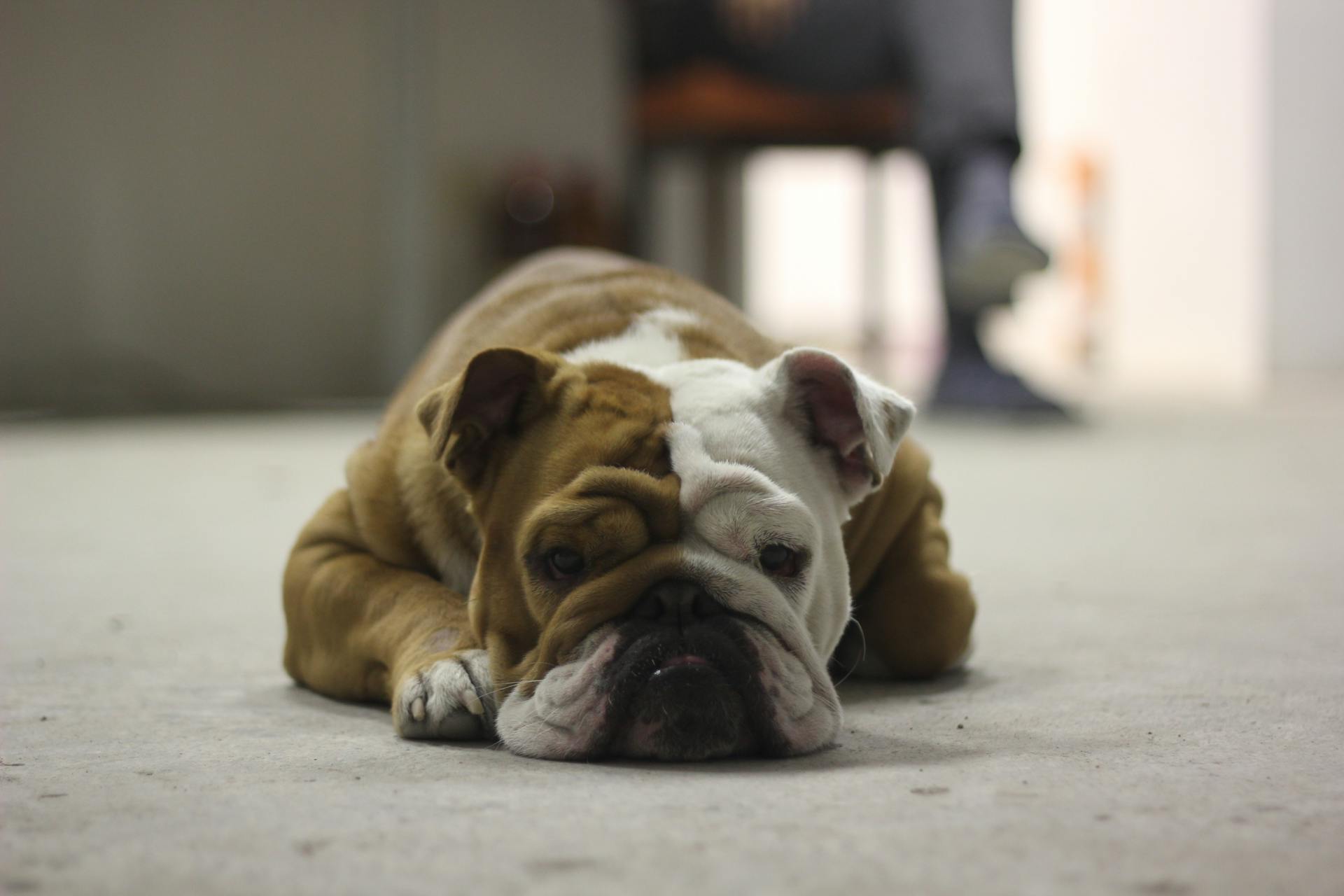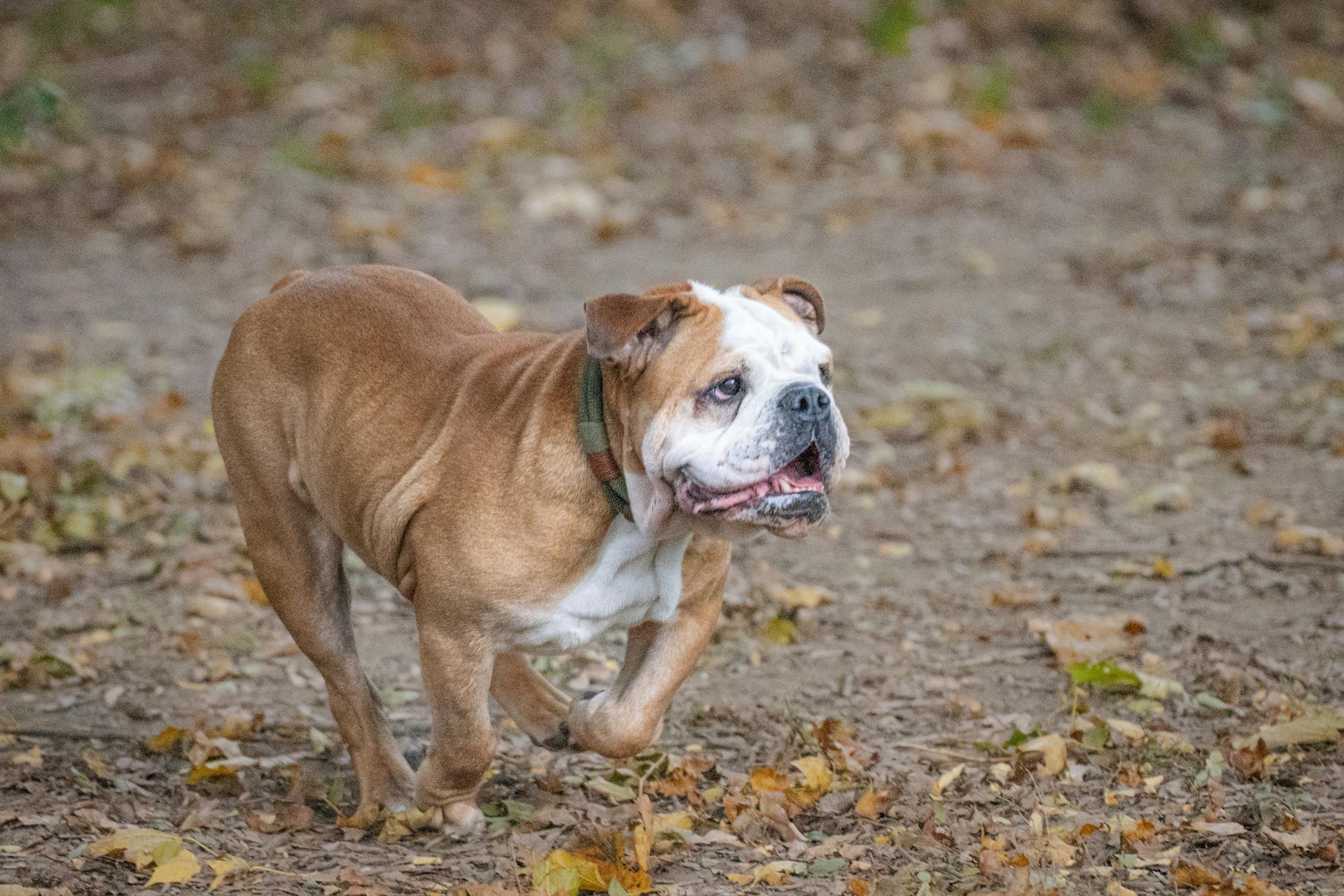
English Bulldogs are prone to dry skin due to their unique skin folds, which can trap moisture and create an ideal environment for bacteria and yeast to grow.
Their short, smooth coats don't provide enough protection from the elements, making them susceptible to dryness and irritation.
Regular grooming can help identify any skin issues early on, such as redness, itchiness, or flakiness.
Dry skin can also be a sign of underlying health issues, so it's essential to monitor your English Bulldog's skin health closely.
Recommended read: How to Treat English Bulldog Skin Problems
Causes of Dry Skin
Dry skin in English bulldogs can be caused by allergies, which can be triggered by food, environmental factors, or even their own skin.
Allergies are particularly common in bulldogs and can lead to dry, flaky skin. They may experience environmental, food, skin, or genetic allergies, which can cause their skin to become dry and flaky.
A lack of moisture can also cause dry skin in bulldogs, as they need a lot of moisture to keep their skin healthy. If they don't get enough moisture, their skin can become dry and flaky.
Here's an interesting read: Staph Infection English Bulldog Skin Conditions Pictures
Poor nutrition is another possible cause of dry skin in bulldogs. They need a well-balanced diet that includes all the necessary nutrients for healthy skin, and a diet lacking in certain nutrients can lead to dry and flaky skin.
Dry skin can be a symptom of a larger problem, such as Cushing's disease, hypothyroidism, or seborrhea, which are serious medical conditions that require veterinary attention.
Suggestion: English Bulldog Diet
Symptoms and Diagnosis
Symptoms of dry skin in English bulldogs can be quite varied, but they often include itchiness, dandruff, flaking, and pimples.
These symptoms can be caused by a range of factors, including allergies, which are common in English bulldogs.
Some dogs may only experience one of these symptoms, while others may present with several. This is why it's so important to keep an eye on your dog's symptoms and work with your veterinarian to diagnose the cause of their dry skin.
Here are some common symptoms of dry skin in English bulldogs:
- itchiness
- dandruff
- flaking
- pimples
- scaling
- hair loss
- inflammation
- odor
- increased oiliness
- scabs
Keep in mind that some dogs may also experience skin issues and gastrointestinal problems due to allergies, which can further exacerbate dry skin symptoms.
Treatment and Prevention
Treating dry skin on English bulldogs requires a diagnosis from your veterinarian to determine the underlying cause. They may prescribe an elimination diet to diagnose food allergies, which involves removing common allergens like beef, soy, corn, wheat, dairy, chicken, and eggs from your dog's diet.
Your veterinarian may also recommend a high-quality diet and supplements to provide the necessary nutrients for a healthy coat and skin. A humidifier can help soothe dry skin, especially during cold and dry weather. Regular grooming and keeping facial skin folds clean in breeds with folds can also prevent dry skin.
To prevent dry skin, feed your English bulldog a high-quality, balanced diet from puppyhood. Regular veterinary checkups can help monitor your dog's overall health and catch dry skin before it gets out of hand. You can also prevent parasites by keeping up-to-date on preventatives and give supplements as prescribed by your veterinarian.
Here are some key prevention tips:
- Feed a high-quality, balanced diet from puppyhood
- Prevent parasites by keeping up-to-date on preventatives
- Groom your dog regularly to prevent the buildup of dirt and debris
- Give supplements when necessary as prescribed by your veterinarian
By following these prevention tips and being aware of potential allergens, you can help keep your English bulldog's skin healthy and happy.
Preventing on

Preventing dry skin on dogs is crucial to maintaining their overall health and well-being.
Feeding a high-quality, balanced diet from puppyhood is essential for preventing dry skin. This will provide your dog with the necessary nutrients for a healthy coat and skin.
Regular grooming is also vital to prevent the buildup of dirt and debris, which can exacerbate dry skin. Give your dog a good brushing at least once a week to remove loose hair and distribute skin oils.
Preventing parasites is another key factor in preventing dry skin. Keeping up-to-date on preventatives will help reduce the risk of skin infections and conditions.
Some breeds are more prone to dry skin than others, so research your breed to discover what skin conditions they're predisposed to and how to prevent them.
Here are some preventative measures you can take to keep your dog's skin healthy:
- Feed a high-quality, balanced diet from puppyhood
- Prevent parasites by keeping up-to-date on preventatives
- Groom your dog regularly to prevent the buildup of dirt and debris
- Give supplements when necessary as prescribed by your veterinarian
- Schedule regular veterinary checkups to monitor your dog’s overall health
- Keep facial skin folds clean in breeds with folds
Treating
Treating your dog's allergies or skin issues requires a visit to your veterinarian for a proper diagnosis. They'll help determine the cause of the problem, whether it's allergies, a skin condition, or something else.
Explore further: English Bulldog Food Allergies

The first step in treating dry skin on dogs is to identify the underlying cause, which may involve an elimination diet or testing for conditions like Cushing's disease. In some cases, treating the underlying condition will also address the dry skin.
For canine food allergies, your veterinarian might prescribe an elimination diet, as there is no reliable diagnostic test for diagnosing food allergens. The most common ingredients that cause food allergies in dogs are beef, soy, corn, wheat, dairy, chicken, and eggs.
Treating allergies in English bulldogs depends on the type and severity of the allergy, so it's essential to work with your vet to accurately diagnose the allergy before beginning any treatment. This may involve a series of tests and trials to determine the best course of action.
Limiting your dog's exposure to allergens is crucial in treating environmental allergies. This can be done by keeping windows closed during high-pollen or high-mold seasons and keeping your dog away from areas with high amounts of pollen.
Antihistamines or other allergy medications prescribed by a veterinarian can help alleviate symptoms, but they may not address the underlying issue. In some cases, immunotherapy may be recommended to help build your dog's tolerance to allergens.
A high-quality diet that provides the necessary nutrients for a healthy coat and skin can help prevent dry skin and allergies. Your veterinarian may recommend a novel protein source, such as an insect-based dog food, to help manage or eliminate food allergies.
Worth a look: Best Food for Olde English Bulldog
Treatment of Flea
To effectively treat flea allergies in your English bulldog, it's essential to keep them on a regular flea prevention program. This can be done through topical or oral treatments, which should be administered monthly year-round.
Regularly washing your dog with a specialized flea shampoo can also help reduce the risk of infestation. This is a simple yet effective way to keep your dog's skin healthy and flea-free.
Keeping your home clean is also crucial in preventing flea infestations. Vacuum frequently, wash your pet's bedding regularly, and remove clutter that may provide a hiding spot for fleas.
Natural remedies like apple cider vinegar and diatomaceous earth can be effective alternatives to traditional flea treatments. These remedies can be used in conjunction with regular flea prevention programs for optimal results.
Related reading: English Bulldog Skin Allergies Home Remedies
Diet and Nutrition
English bulldogs can be prone to dry skin, and their diet plays a crucial role in maintaining healthy skin.
Feeding an all-natural diet that's free of artificial colors or preservatives is essential for their skin health. This means opting for raw and fresh diets, or adding fresh vegetables and other ingredients to their kibble.
Proteins like beef and chicken are common culprits behind food allergies in dogs, which can cause dry skin. Other ingredients like dairy, eggs, wheat, rice, and soy can also trigger allergies.
Nutritional deficiencies, particularly a lack of fatty acids, can also cause dry skin. Omega-3 fatty acids, for example, are essential for maintaining skin health.
Your dog's food should be AAFCO Statement approved to ensure it includes all necessary nutrients. If you suspect a food allergy, an elimination diet can help identify the culprit.
Switching to a high-quality dog food containing essential fatty acids can greatly enhance your dog's skin and coat condition.
Related reading: English Bulldog Dry Nose
Grooming
Bathing your bulldog too much can cause dry skin. Removing the oils that naturally occur in the skin can lead to this issue.
It's recommended to bathe your dog only once a month, unless there are circumstances in which it becomes really dirty. This allows the skin to build up the essential oils it needs.
A good homemade shampoo for dry skin can be made by combining one-third cup of glycerin with one cup each of Lemon Joy and white vinegar, with one quart of water. This mixture helps to moisturize and soothe the skin.
Using a conditioner made for dogs can also help eliminate dry skin. This can be a simple and effective solution to add to your dog's grooming routine.
Health Issues
Dry skin on English bulldogs can be a sign of allergies, which are common in dogs. Flea allergy dermatitis, an allergic reaction to flea saliva, is the most common skin disorder in American dogs.
If your English bulldog has allergies, it can lead to a wide range of skin issues, including inflammation, excessive itching, redness, hair loss, and sores. Excessive pawing, licking, and scratching are signs of irritation.
In severe cases of allergies, secondary infections may occur, which can require urgent medical attention. It's essential to take your dog to the vet as soon as possible if you notice any wounds or sores.
A fresh viewpoint: Dogs Similar to English Bulldog
Parasites
Parasites can cause dry skin on dogs, leading to skin irritation and scabbing if left untreated. Fleas, ticks, and mites are common culprits.
Mange is a serious skin condition caused by mites that can result in acute irritation, crusted skin, inflammation, and hair loss. It's essential to seek veterinary care if you suspect your dog has mange.
Parasites like Demodex mites, canine scabies, and cheyletiellosis (Walking Dandruff) can cause dry, flaky skin on dogs. These conditions require a trip to the veterinarian for proper diagnosis.
Diagnosing parasites that cause dry skin on dogs often involves a referral to a specialist in veterinary dermatology.
Infections
Infections can be a serious concern for dogs, and it's essential to recognize the signs and symptoms early on. Skin problems in dogs can be caused by bacterial and fungal infections.
Some common dog skin infections include Staph infection, Ringworm, Seborrhea, yeast dermatitis, and fungal infections.
These infections can cause a range of symptoms, including dry flaky skin, scabs, and hair loss. They can also lead to secondary infections, which can be life-threatening if left untreated.
Dry skin in dogs should never be taken lightly. If you notice any signs of irritation, such as excessive pawing, licking, or scratching, it's crucial to take your dog to the vet as soon as possible.
The following infections are transmissible to humans: Ringworm and fungal infections.
Here are some common symptoms of dog skin infections:
- Infection with Staph
- Ringworm
- Seborrhea
- Dermatitis caused by yeast
- Fungal Infections
Your veterinarian may diagnose canine skin infections by taking skin scrapes for cytology. If you suspect your dog has a skin infection, don't hesitate to seek veterinary attention.
Health Issues
Dry skin on dogs can be a symptom of a larger issue, such as Cushing's disease or hypothyroidism, which can also cause dry and brittle hair, hair loss, and skin infections.
Flea allergy dermatitis is the most common skin disorder in American dogs, caused by an allergic reaction to flea saliva.
Dogs get allergies just like people do, and food allergies, environmental allergies, and seasonal allergies can cause dry skin, itching, redness, and inflammation.
Expand your knowledge: English Bulldog Hair
If left untreated, allergies can result in atopic dermatitis, a skin condition that can lead to secondary skin infections.
Dry skin can be relieved by keeping your dog hydrated and fed a nutrient-rich food, and by using a mild, hypoallergenic dog shampoo and drying their skin thoroughly after bathing.
Wrinkle Paste can help protect your dog's skin from dryness and irritation, and Squishface Wrinkle Wipes can be used in between baths to keep your dog's skin clean and healthy.
If you suspect your dog has a medical condition or is showing signs of yeast infections or bacterial infections, consult with a veterinarian for proper diagnosis and treatment.
Broaden your view: English Bulldog Wrinkle Infection
Flea
Flea allergies can be a major issue for English bulldogs, causing severe itching and inflammation of the skin.
Flea allergy dermatitis, or FAD, occurs when a dog is highly sensitive to flea saliva.
Just a single flea bite can set off this reaction, making English bulldogs particularly susceptible to flea bites due to their short, thick fur.
English bulldogs can be prone to skin irritation and dry skin caused by fleas, ticks, and mites.
Fleas can cause scabbing if left untreated, and in severe cases, secondary infections may occur that require urgent medical attention.
Regular flea prevention programs, such as topical or oral treatments, can be effective in reducing the severity of flea allergies.
Natural remedies like apple cider vinegar and diatomaceous earth can also be used to help control flea infestations.
Keeping your home clean by vacuuming frequently, washing your pet's bedding regularly, and removing clutter can also help reduce the risk of infestation.
Routinely washing your dog with a specialized flea shampoo can also help reduce the risk of infestation.
Sources
- https://www.cuteness.com/article/home-remedy-dry-skin-bulldog
- https://www.bulldogology.net/my-dog-has-dry-flaky-skin-and-scabs/
- https://www.akc.org/expert-advice/health/dry-skin-on-dogs/
- https://jiminys.com/blogs/news/allergies-in-english-bulldogs-a-guide-to-causes-symptoms-and-treatment
- https://squishface.com/blogs/blog/why-does-my-bulldog-have-dry-and-flaky-skin
Featured Images: pexels.com


